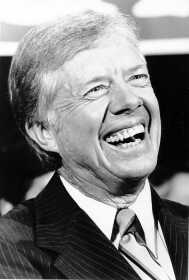Jimmy Carter’s presidency and its impact on Nebraska

Jimmy Carter’s presidency, from 1977 to 1981, remains a study in contrasts – marked by ambitious goals, unforeseen crises, and lasting legacies. For Nebraska, Carter’s tenure carried specific ramifications, reflecting the broader challenges and opportunities of his administration.
Carter inherited a nation grappling with economic turbulence, energy insecurity, and a crisis of confidence following the Watergate scandal. His administration’s focus on energy reform and agricultural policy particularly resonated in Nebraska, a state deeply tied to farming and rural energy concerns. Carter’s efforts to transform the energy sector included promoting renewable resources and conservation, which, though forward-thinking, sometimes clashed with the immediate needs of agricultural communities.
The Energy Security Act of 1980 was intended to reduce U.S. dependence on foreign oil and incentivize renewable energy initiatives, such as ethanol production. Nebraska, a key player in corn-based ethanol, benefited from Carter’s push for biofuels, laying the groundwork for an industry that continues to thrive today. However, the broader energy crisis, including rising fuel costs, burdened rural communities reliant on affordable transportation and heating. Nebraskans, like many Americans, felt the sting of long gas lines and skyrocketing utility bills, which added to the economic strains already pressing on the heartland.
Carter also prioritized agricultural policy, a cornerstone of Nebraska’s economy. His administration expanded federal subsidies and introduced measures to stabilize farm incomes. Yet, these efforts were undercut by broader economic forces, including high inflation and fluctuating crop prices. For many Nebraska farmers, the late 1970s brought financial uncertainty that overshadowed the administration’s good intentions. Carter’s grain embargo against the Soviet Union in response to their invasion of Afghanistan dealt a severe blow to Nebraska’s agricultural exports, particularly for wheat and corn. While principled in its stand against Soviet aggression, the embargo disproportionately impacted states like Nebraska, where farming is not just an economic activity but a way of life.
Beyond the fields, Carter’s emphasis on rural development left a mixed legacy. Programs aimed at modernizing infrastructure and improving access to essential services brought some benefits to Nebraska’s smaller communities. The Rural Electrification Administration saw updates that supported rural energy distribution, while investments in education and health care modestly improved the quality of life in some areas. However, critics argued that these measures lacked the scale needed to reverse decades of rural decline.
On the political front, Carter’s administration energized Nebraska’s environmental movement. His designation of federal lands for conservation and emphasis on clean energy bolstered local advocacy for sustainable practices. Yet, his presidency also highlighted tensions between conservation goals and agricultural practices, a dynamic still evident in Nebraska’s debates over land use and water rights.
Perhaps Carter’s most lasting impact on Nebraska lies in his post-presidency example of moral leadership and public service. His humanitarian efforts, including work with Habitat for Humanity, resonate deeply in a state that values community and service. Nebraskans, regardless of their views on his presidency, often respect Carter for embodying integrity and commitment to the public good.
Jimmy Carter’s presidency was a complex chapter for Nebraska, blending opportunities and challenges. While his policies shaped the state’s energy and agricultural landscapes, the era also underscored the vulnerabilities of rural America during times of national and global upheaval. Today, Nebraskans can reflect on Carter’s legacy as a reminder of the enduring interplay between national leadership and local resilience.
